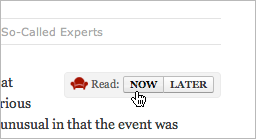
If you’ve been to any of the longer posts on this site (especially many in the first person series), you may have noticed read “now” and “later” buttons at the top of the post. We’ve recently integrated Readability with the site, allowing readers to view articles with a more book-like clutter-view, or save for later on iOS devices.
This video explains it in a bit more depth:
Try it out on some longer articles:
- The Challenge of Writing in a Digital Age
- Professional Writing and the Rise of the Amateur
- So you’re moving to Hollywood
- How Less IMDb came to be
- I voted
- Authorship in the digital age
- Sundance, The Nines, and the death of independent film
- Why writers get residuals
- Money 101 for screenwriters
- Seven Things I Learned from World of Warcraft
- In praise of unsheets
- Moving to LA (via NYC)
- Masturbating to Star Trek
- Kindle formatting for web geeks
- James Cameron on 3-D
- Should I write a novel or a script?